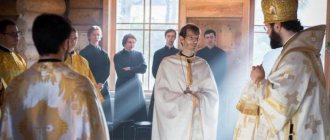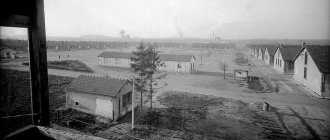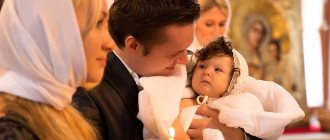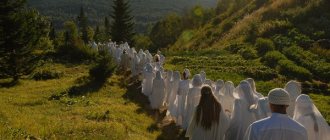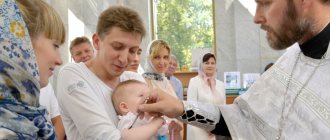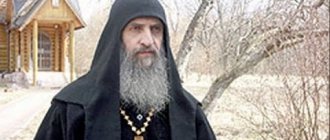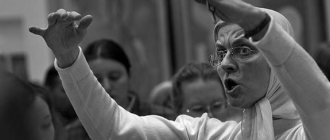From the moment Our Lord Jesus Christ descended to earth and began his preaching, people appeared who, at his word, were ready to leave everything and follow him.
Moreover, if the disciples of Christ - the apostles, set out at the direction of the Savior to preach His word to the peoples of the world, then other followers of Jesus Christ decided to leave the world.
They decided to sacrifice all worldly pleasures, as well as family and property, in order to serve God especially diligently. Such people had and have a special “calling,” that is, an irresistible desire to lead a monastic life, devoting it all to serving God.
A monk is a person who constantly glorifies God
The word "monk" is of Greek origin. It is translated as lonely, living in solitude, solitary.
Monasticism is a way of life for those Orthodox Christians who decide to devote themselves entirely to prayer and ascetic deeds.
If we consider the theological point of view on the institution of monasticism, then it says that it is a religious-church institution.
It unites those people who decided to isolate themselves from the outside world in order to find an ideal form of serving God.
Video: Venerable Anthony of Pechersk. Series of television programs “The Law of God.” Part 1. About faith and Christian life. The film tells about the life of St. Anthony of Pechersk, the founder of monasticism in Rus'.
In Russia, monks are often called monks, from the word “other.” Monasticism is then called monasticism. There is no direct mention of the word "monk" in the Bible.
At the same time, the Holy Fathers say that the prototype of a monk in the Holy Scriptures can be John the Baptist, who led a solitary life.
The goal of a monk is to constantly praise God in prayer.
In Rus', the founder of Kiev-Pechersk Lavra is considered the founder of monasticism.
The goal of a monk is to constantly glorify the Creator. That is why he leaves the world, so that it does not tempt him and distract him from serving God. In this he is like an Angel, who is always ready to fulfill God's will. The angels constantly praise the Lord, and the monk is constantly in prayer.
V. Tropinin “Monk with a Candle”, 1834. The goal of monastic life is to achieve a state of holiness and receive God's grace
It must always be remembered that the term monasticism in Orthodoxy applies only to those individuals and communities that follow certain rules.
So a monk must take on some vows, for example, renunciation of all the blessings of the world.
In addition, he must obey the rules of the monastery in which he lives or receive a blessing to lead a monastic life in a monastery or cave.
The goal of monastic life is to achieve holiness or spiritual perfection in order to receive God's grace and save the laity.
Requirements for workers
- The admission of workers to live in the monastery, who want to work for the glory of God (free of charge), into the monastery is not carried out constantly, but only when urgently necessary, and only for a period determined by the monastery authorities, subject to the condition that the workers fulfill the obediences assigned to them.
- As laborers, only Orthodox people are accepted into the monastery, for whom the primary and most pressing task is church life, namely, a person’s desire to strengthen himself in the Christian way of life, to continue the process of his churching through participation in the Holy Sacraments and the entire way of monastic life; people who, in turn, ascending through humility, obedience and prayer, have as their ultimate goal the acquisition of Christian virtues and Gospel perfection with God’s help.
- The worker must be a church member or, before arriving at the monastery, by regularly attending church services, confessing and receiving the Holy Mysteries of Christ, begin the process of becoming a church member.
- Before turning to a monastery for a blessing for his work, a person must first receive a verbal blessing for this trip from his confessor or the priest to whom he constantly confesses. However, the blessing of your confessor or priest does not mean the right to immediately come to the monastery, since such a right can only be given by the leadership of the monastery.
- It is necessary to provide a written blessing from your priest or confessor or a positive reference from another monastery where the person previously labored, if available.
- The employee's age must be at least 18 years and not exceed 55 years.
- Since the monastery does not have an inpatient hospital with appropriate medical personnel, equipment and medicines, the monastery cannot accept those wishing to work with severe chronic illnesses who may require inpatient medical care. To avoid infecting others, people with infectious diseases are not accepted. Therefore, the monastery accepts workers who do not have physical limitations that prevent them from fulfilling monastic obediences.
- The employee must have a valid civil passport, permanent registration at the place of residence, and a compulsory medical insurance policy valid on the territory of the Russian Federation. A worker who is not a citizen of the Russian Federation, in addition to his passport, must have a valid visa or migration card properly issued.
- Persons wishing to stay as workers and planning to work in the monastery for more than 1 month must obtain the following medical documents in advance: certificates from psychoneurological, tuberculosis, drug addiction and a “hospital certificate”. The detailed contents of the hospital certificate can be found in the office of the Diocesan Administration. Persons who do not want or do not bother to make these certificates in advance will be forced to leave the monastery after one month.
- Neither the monastery nor the local administration has the premises, personnel, equipment and medicines to treat or rehabilitate persons suffering from drug, alcohol addiction or mental disorders or illnesses. Therefore, the monastery cannot accept persons suffering from the noted ailments as workers. If the fact of serious addiction is concealed, as soon as it becomes known, the person in question will be forced to leave the walls of the monastery.
- The monastery does not accept persons of non-traditional sexual orientation, persons who speak negatively about the leadership of the Orthodox Church, or persons who are negatively opposed to other nations or peoples.
- The monastery also does not accept persons hiding from the law, law enforcement and other authorities, or evading military service, taxes. If such a fact is discovered, the management will be forced to immediately notify the relevant authorities.
- Since the monastery does not have a clothing warehouse, it cannot provide workers with special clothing, so the worker must bring with him a full set of work and personal clothing and shoes for working indoors and outdoors, in any weather conditions and for the appropriate time of year, as well as the same hygiene products and medicines he needs. The monastery has only a medical office with the simplest medicines.
- The worker must have with him a sufficient amount of money (at least 1000 rubles) to pay for travel to the monastery and back. The monastery does not provide money for travel.
- A worker who has once left the monastery early (either on his own or on his own initiative) due to violations of the monastic regime, a conflict situation that has arisen, or other negative reasons (alcohol intoxication) may be refused re-admission as a worker. This person, in the presence of the above reasons, can be readmitted only after presenting a written recommendation from another monastery about the impeccable completion of labor in it for at least six months (in case of gross violations - a longer time). Moreover, no more than two weeks should pass from the date of issuance of such a recommendation to the day of arrival at the monastery.
- Men and women who wish to receive a blessing for arrival and find out the date of possible arrival at the monastery, if they have all the relevant documents, must submit an application.
People go to the monastery to glorify God
Many lay people are interested in knowing why people go to the monastery. For a believer, it will not be difficult to answer this question. The fact is that one becomes a monk in order to glorify God.
At the same time, the monk must also strive to achieve a state of spiritual perfection, that is, holiness. To do this, you need to completely defeat passions and evil in yourself. Only in this case will the monk be able to bring the light of Christ’s Truth to the world.
Vasily Ivanovich Navozov “Spiritual nourishment.” 1890 A monk is a warrior of Christ, waging a constant spiritual battle with his passions for the sake of the Kingdom of Heaven
Unfortunately, many people are simply unable to understand why they go to a monastery. This is due to the fact that back in Soviet times, the opinion was formed that only people who had experienced great grief or were failures in life became monks.
Hence the advice given to friends who find themselves in difficult life situations to leave the monastery.
St. John Climacus says that a monk is a warrior of Christ.
You can often meet former criminals, alcoholics, and drug addicts in monasteries. Also living here are those people who are left alone. You can meet sick people and various seekers of “spiritual truths” here.
All these people may be in a monastery, but they will never become monks. The fact is that monasticism is voluntary martyrdom, and having taken upon yourself once, you will have to bear the cross for the rest of your life.
Yuri Volodin "Monk". year 2009. A monk withdraws from the world in order to pray and concentrate on spiritual work on himself
St. John Climacus says that a monk is a warrior of Christ, waging a constant spiritual battle with his passions for the sake of the Kingdom of Heaven.
To do this, he renounces worldly temptations and pleasures in order to concentrate on prayer and spiritual work on himself.
In addition, the monk is also obliged to carry out obedience in the monastery and engage in physical work, among other things.
That is why a series of tests have been established for those wishing to become a monk, the purpose of which is to find out how prepared a person is for monastic life and how strong his desire to enter a monastery is.
To become a monk you must take monastic vows
Since a monk is a person who has decided to give his entire life to serve God, he serves him every minute. Outwardly, this is manifested in the fact that before tonsure, the future monk takes monastic vows.
A vow is a promise made to God.
It should be noted that to live a monastic life you must have a special spiritual calling, so usually many people come to the monastery, but few remain.
The monk takes 3 ascetic vows.
Mikhail Nesterov. “Under Blagovest”, 1895. A monk must constantly glorify God in prayer, therefore, before tonsure, he imposes vows on himself that allow him to escape from the vanity of the world.
The purpose and meaning of a monk’s life is prayer. That is why he renounces the world, so that nothing earthly distracts him from her. There are three main monastic vows:
- obedience or renunciation of one's will. According to it, the monk undertakes to renounce his desires and direct his efforts to being with the Lord. To do this, the monk undertakes to obey his abbot, abbess or spiritual father, who will guide him in his spiritual life;
- chastity or celibacy. In general terms, this means renouncing married life for the sake of the Kingdom of Heaven. In a broad sense, this vow means leaving everything worldly;
- non-covetousness. A monk does not need anything in earthly life and things cannot belong to him. Living in a monastery, monks care about its welfare, and not about satisfying their personal needs. At the same time, he retains his personal belongings, such as glasses.
Monk of the Sretensky Monastery.
One of the vows taken when becoming a monk is non-covetousness. Monastic vows are pronounced before tonsure, but before pronouncing them, you need to go through a long and difficult path. It begins with working on oneself while still in worldly life, since before becoming a monk, one must become a perfect layman.
That is why there are no detailed instructions on the topic “how to become a monk,” because only a person himself can become a true believer as a result of long-term spiritual work on himself.
Chief Vow
– What is the main vow of a monk?
– The monk promises God to maintain chastity, non-covetousness and obedience. These are the three pillars on which the entire monastic life is built. A person who is completely devoted to the vow of obedience has a much easier life. If you do something of your own free will, the result is disastrous. It seems like I did everything right, but something is missing. For a monk, being obedient is the basis of life.
– Do you know the feeling of loneliness? Didn't it get worse in monasticism?
– I once had a conversation with His Beatitude Metropolitan Vladimir. We talked about choosing a life path. I was 23 years old then. I said that it was somehow alarming to realize that a monk remains alone for the rest of his life. Vladyka told me not to worry about this, because I would never be alone. God is always with a monk, and He will send the people he needs at a certain stage of life. I always remember these words, even the facial expression and emotions with which His Beatitude spoke them. And now, 10 years later, I find confirmation of what was said in my own life. The Lord sends me a sufficient number of wonderful people, some of them open up to me in a new way. A person should not be deprived of communication. But the most important thing is harmony in communication with God.
– What habits did you have to give up when you became a monk? What did you leave behind in your past life?
– In monasticism, I realized the seriousness of self-discipline. It is very important to have the right and firm attitude in life. After tonsure, Bishop Rector Metropolitan Anthony presented me with the Fatherland Book of St. Ignatius Brianchaninov with a dedicatory signature and a short wish: “Always remember your monastic vows.” These words should run like a red thread in the life of a monk. When a person relaxes, even a little, he stops feeling the fall. And having fallen, he realizes that he should have woken up earlier. There will be temptations in any case, because the life of a monk is a constant struggle with oneself, with one’s thoughts. The monk must conquer himself. I always remember the expression of our Primate, His Beatitude Metropolitan Onuphry: “We must be strict with ourselves and merciful towards others.”
– How do you deal with feelings of self-pity?
– When I analyze all my thoughts, actions and deeds, I don’t feel sorry for myself. I never try to find fault in another person, but I look for it in myself. Sometimes thoughts are aimed at self-justification, but they must be suppressed, because the enemy, in subtle interpersonal relationships, tries to sow enmity and misunderstanding, which then turns into anger and bitterness. You cannot think about sinful thoughts; they must be stopped at their inception.
In Orthodoxy there are three degrees of monasticism
The Holy Orthodox Church distinguishes three degrees in monasticism:
- Preparation for monastic feat or novitiate.
- The feat itself is monasticism.
- The highest degree of fulfillment of the monastic feat is schematicism.
Collaboration in the Sharovkin Monastery.
Before tonsure, novices are required to pass a test in the monastery, having worked in it. In some monasteries, there are up to six stages of preparation for tonsure. Usually, before entering a monastery, they ask for a blessing from their spiritual father. Moreover, if a person feels ready for a monastic feat, he can come to the monastery on his own.
In any case, before a newly admitted monk is tonsured, he will be put on probation until the abbot of the monastery is convinced of the sincerity and firmness of his decision.
The Orthodox Church distinguishes 3 degrees of monasticism.
In some monasteries there are up to six stages of preparation for tonsure. In any case, all those newly admitted to the monastery or newcomers are obliged to work.
There is a rank of laborers or laborers, that is, those people who live in a monastery “for the glory of God,” but do not have the goal of becoming monks.
A novice or novice has the goal of becoming a monk, so he stays in a monastery in order to study all the intricacies of monastic life.
An example of a monastic charter is the Charter of the Holy Dormition Zhirovichi Stauropegial Monastery. This is what it says about the behavior of newcomers who entered the monastery:
Charter of the Holy Dormition Zhirovichi Stavropegial Monastery.
Ҥ 44. The novice must try in every possible way, abandoning secular habits, to become imbued with the spirit of monastic life, remembering the instructions of St. Basil the Great to beginning monks:
“Have a modest gait, speak distinctly, observe decorum in conversation, eat food and drink reverently, remain silent in front of elders, be attentive to the wise, obedient to those in authority, have unfeigned love for equals and lesser ones, avoid the evil, speak little, collect carefully knowledge, not to talk too much, not to be quick to laugh, to be adorned with modesty" ("Teaching for January 1st to the students of the philosopher Livan")."
Fyodor Mikhailovich Golovin is a novice at the Solovetsky Monastery.
June 10, 1917 A novice has the right to wear a cassock and a scarf. A novice has the right to wear a cassock and a scarf. The seminarian and sexton are accepted into the monastery with the rank of novice.
Any believer can become a novice, but not everyone can take monastic vows. Some people live in monasteries for many years, being in the rank of novice.
When a person is tonsured a monk, he takes a new name
In the practice of the Russian Orthodox Church, monastic tonsure is performed on monks or nuns. At the same time, there is the rank of ryassophore novice or novice.
He differs from an ordinary novice in that the cassock novice is allowed to wear a cassock, kamilavka and rosary. In addition, the ryassophore receives a new name.
“The rank applied to the cassock and kamilavka, which is the cassock.” 1906 Ryasophorus is the first order of monasticism. Ryasophorus is allowed to wear a cassock, kamilavka and rosary
A priest in the rank of cassock in Russia is called a hieromonk. At the same time, many priests who have accepted celibacy accept this first order of monasticism, because without this, ordination to the priesthood is impossible. It is necessary to distinguish a novice ryassophore from a ryassophore monk. A monk is a monk.
He is tonsured and, having become a monk, it is almost impossible to return to worldly life.
The tonsure itself represents a vow of renunciation from the world. When it is performed, a person's hair is symbolically cut. He is given a new name in memory of the saint who becomes the patron saint of the person being tonsured.
Many, having accepted the monastic rank, others do not accept the ranks of monasticism and live in it all their lives.
Great schema. Suzdal Museum-Reserve, 2015. Monks tonsured into the Great Schema wear appropriate attire. The Great Skhemniki are the highest degree of monasticism
In addition to the ryassophore, monks are tonsured into the mantle and into the schema. This is the perfect and most perfect degree of monasticism. All degrees differ from each other in the vows that the person tonsured in them took upon himself.
A monk directly becomes a monk after he is tonsured into the minor schema, since it is then that he pronounces three monastic vows.
As for the Great Schemas, this is the highest degree of monasticism and only these monks can live in seclusion and hermitage, as well as take other vows and perform ascetic deeds.
Victor is the winner
– Father, did you expect to receive the name Victor in tonsure? Who were you named after? Enlighten us a little.
- In honor of the martyr Victor of Damascus. I guessed what the name might be, but had no definite preferences. For me, the main thing was not the name, but the tonsure for which I was preparing, the awareness of the importance and seriousness of such a change in my life.
– What is known about your patron saint?
– Not much, but there is still little information about Victor of Damascus, and even that information is contradictory. Since 1906, his relics have been located in the Italian city of Fano. I have hope that the Lord will deign to visit there someday and venerate the incorruptible remains of my heavenly patron. Immediately after tonsure, one monastery governor gave me a small piece of the relics of the martyr Victor as a gift, and another priest close to me gave me an ancient icon of the saint, into which I placed the relics. This shrine is located in my holy corner, where I pray to my Angel every day.
– Is anything known about the death of the martyr?
– The Christian warrior Victor (from Greek “winner”) suffered martyrdom for Christ in the middle of the 2nd century in Damascus for refusing to worship the pagan gods. By human standards, the death of the saint was very difficult. He was thrown into a hot oven, where he remained unharmed for three days, forced to eat poisoned meat, his veins were pulled out, thrown into a cauldron of boiling oil, hung on a tree and his body was scorched with candles. Then they gouged out his eyes, tore off his skin and beheaded him, after which a miracle happened: blood and milk flowed from his body. The saint's memory is celebrated annually on November 24. By the way, in the paintings of the Kyiv St. Sophia Cathedral there is one of the ancient images of the martyr Victor (1st half of the 11th century).
Monks live in a monastery where they perform obediences
Monks usually live in monasteries, although there are cases of hermitage or seclusion. To live in a hermitage or cave, a monk must receive the blessing of the abbot of the monastery to which he is assigned.
Life in the monastery follows a strict schedule established by the monastery charter. Usually it regulates both the prayer and economic life of the monastery.
Monks of the Pskov-Pechersky Monastery. Monks usually live in a monastery, although there are cases of seclusion and hermitage
Obedience in a monastery is the work that monks do in their free time from prayer and worship. Obedience has two purposes:
- economic The monastery must be kept in order, and monks, in addition to spiritual needs, also have physical needs. That is why in almost all monasteries obediences are performed in the refectory, bakery, garden, etc.;
- educational. Not everyone can pray day and night. Therefore, time free from prayer can become idleness for some. Idleness distracts a monk from serving the Lord, so the more he works, the fewer temptations he will have.
Prokudin-Gorsky.
Monks planting potatoes. 1910 Obedience in a monastery is assigned by its abbot, depending on the abilities of the novice or monk. Obedience in a monastery is appointed by its abbot. He must see and understand which of the novices or monks should be sent where.
The abbot can also exempt a monk from obedience altogether if he sees that his whole life is occupied exclusively with serving God. This usually applies to those monastics who have accepted the great schema.
How and why do people become monks today? This is what they say themselves
Estimated reading time: 6 minutes.
There is a strong stereotype among people that they go to a monastery only out of loneliness or grief, if they cannot find their “place in life” or to atone for a terrible sin. We collected stories of modern monks and made sure that this is not always the case.
Nun Elisaveta (Senchukova), press secretary of the diocesan administration of the Yakut and Lena diocese
Maria Senchukova - that was the name of nun Elisaveta in the world - took monastic vows at the age of 31. Many in her circle believed that she was in a hurry, that she could still get married and start a family. And she was sure that family was not her path. And from the age of 18 I began to think seriously about monasticism. Her path to tonsure turned out to be long, but eventful - this kind of “hopelessness” from which you want to run away cannot exactly be called. As a result, a graduate of the Institute of Philosophy of GAUGN and a successful journalist, Maria found her true calling.
“The years passed, I began teaching, then journalism, then I went on a business trip to Yakutia, then I moved there to work in the diocese, then I became a monk. The rank of angels, by the way. I think that's right. Because once upon a time, as a teenage girl, it wasn’t long black clothes that fascinated me. Through them the Lord touched me on the shoulder. I called. Called. And I responded, although it took me a long time to respond. Therefore, journalism, which I came to not by vocation, but by circumstances, led me to Him,” said mother Elisaveta.
To everyone who seeks refuge in monasticism from the seeming meaninglessness of life, but still hesitates even a little, she advises to wait: “...Here you need to be especially careful. The temptation to run away from yourself in a long black dress and hide within the monastery walls is too great... Monasticism can be the answer to your torment and quest only in one case: if you understand that you cannot live without God.”
Mother Elizabeth is convinced that it is at this moment of realizing oneself as a monk that a person’s change occurs - and not during the tonsure itself.
“A change of mind occurs not when, during tonsure, you crawl through the temple while singing the troparion “Embrace of the Father,” but when, even before tonsure, you suddenly understand that God has taken your heart entirely and without a trace. You yourself gave Him your heart. There is now a hole in my chest and it always hurts. Option one is to give yourself along with your heart, arms and legs, head and every cell of your brain.”
Hieromonk Gennady (Voitishko), head of the Sector of Parish Education of the Synodal Department of Religious Education and Catechesis of the Russian Orthodox Church.
“I could never imagine that I would be a priest. And a monk too. I perceived myself exclusively as a specialist in the field of marketing communications and a PR specialist, although sometimes I began to think about how to devote all my time to serving God, the Church and people,” Father Gennady said in an interview with Thomas.
Indeed, most of Roman’s life (that was his name before he was tonsured) was not at all connected with the Church. He came to the temple while studying at the history department of Brest State University. He began to sing in the choir, read a lot of spiritual literature, but in ten years he received communion only a few times. Then there was a job on television, an invitation to the civil service, an offer to work in Moscow - to do advertising and PR. From a professional point of view, life was rapidly going uphill, but after five years of such a career race, Roman suddenly realized that he had not been to church for a long time: “I asked myself: “In general, do I live as a Christian?” And he answered himself: “No.”
From that moment his church “career” began: work in the information service of the department of religious education and catechesis. There he realized that he wanted to become a monk - he felt that the Lord was calling him to such service.
“I remember the moment of tonsure, when I bowed my head and heard: “God’s servant Gennady is tonsured...”. “Who is this, Gennady?” - Think. And then I realized that it was me: in the world they called me Roman, and when I was tonsured, Vladyka gave me my name in honor of St. Gennady, Archbishop of Novgorod,” recalls the hieromonk.
The tonsure greatly changed the former PR man. And he still feels these changes.
“After tonsure and ordination, I began to realize: serious, profound changes were taking place inside me. Previously, I could react sharply to the words or actions of another person that irritated me. Now I began to notice how grace works, “always healing the weak and replenishing the poor.” And I still feel the internal changes, this is the strength, the inner support that God gives to carry out his ministry daily twenty-four hours a day, seven days a week, three hundred and sixty-five days a year,” said Father Gennady.
Hieromonk Kirill (Zinkovsky) - rector of the Nikolo-Ugreshsky Theological Seminary and Hieromonk Methodius (Zinkovsky) - cleric of the Kazan Church in Vyritsa
Twins Evgeniy and Stanislav were born and raised in an ordinary Soviet family, in which it was simply not customary to talk about God. The father, a professor, also predicted a scientific path for the children. Everything was going that way: the boys studied well at school and graduated with honors from the Leningrad Polytechnic Institute. After brilliantly defending their dissertations in 1995, they were offered year-long internships in the States or Holland, but they refused - and that same year, unexpectedly for their loved ones, they entered the St. Petersburg Theological Seminary. And in the first year they took monastic vows.
“There was one significant case. The then rector of St. Petersburg theological schools, Bishop Konstantin (Goryanov) of Tikhvin, took us as subdeacons. Once he served in the Church of St. Catherine in Murin. Usually the bishop immediately leaves after the service, but for some reason he sat down in a chair in the altar to rest, and we suddenly decided at the same time to tell him that we were baptized in this church. He responded: “Oh, well, that means you are no longer neophytes, you need to accept monasticism.” Vladyka apparently sensed our mood, but we had the intention of becoming a monk somewhere in a monastery. Even before the seminary, we tried to modestly explain to our confessor that we had already studied a lot in life, and we could read books ourselves, we were taught to work with literature. But the priest blessed us for theological schools, and after the bishop’s proposal, for tonsure at the Academy. In both cases, Father John only asked to go to the famous elder, Archpriest Nikolai Guryanov, he had known him for 40 years,” Father Methodius told Foma.
But his brother, Father Kirill, answers the question about monasticism briefly: “This thought itself grew in the soul.”
Hieromonk Prokhor (Andreychuk), resident of the Holy Dormition Pskov-Pechersky Monastery
Igor Andreychuk grew up in a believing family, but was an absolutely ordinary teenager: he studied at a metallurgical technical school, went to discos, sometimes returned drunk, did not really delve into himself, and certainly did not think about any of his vocations. By the age of sixteen, the young man developed a severe allergy, and his mother, in parallel with drug treatment, prayed for a long time for her son’s health. Once I persuaded him to go to Diveevo. “Temples, nuns, endless services... I was simply in shock. At first, this all made me very depressing: prayer day and night, and no comfortable hotel for you - a miserable house with amenities on the street... But my mother prayed to St. Seraphim of Sarov every day, and my heart little by little began to thaw,” recalls Hierodeacon Prokhor in his notes, which "Foma" published. Towards the end of his stay at the monastery, the young man suddenly became imbued with monastic life: he realized that there was nothing superfluous or vain in it, only God. “When on the day of departure I went up to venerate the icon of the Mother of God “Tenderness,” a thought suddenly struck me: I must become a monk.”
A month later, Igor and his mother went on a pilgrimage to the Pskov-Pechersky Monastery, and the young man realized that he wanted to stay there forever. And so it happened - in 1995 he entered the monastery as a novice, and five years later he was tonsured a monk.
“The most joyful memories from my monastic life are those moments when my father and I, with Father John (Krestyankin), walked, read canons, akathists in the fresh air while the birds were singing, squirrels came down to us, we could feed them from our hands. These were the most joyful, blessed, unique moments! Such calmness, such light emanated from him! I still remember how kindly he always greeted me: “Oh, Prosha has come!..” recalls Father Prokhor.
Cell - place of residence of a monk
A monk's room in a monastery is a cell. In Russian monasteries it usually looks like a small room for one or two monks.
It contains a table, chair, bed or hard couch. You can often find an individual iconostasis or a book shelf. In his cell, the monk spends his free time in prayer or reading spiritual books.
Reconstruction of a cell according to the charter of Kirill Belozersky, Ferapontov Monastery. A cell is the place of residence of a monk
Outsiders are prohibited from entering the cell. This is especially true for representatives of the opposite sex. In case of violation of such a prohibition, the owner of the cell may be punished in accordance with the monastic Charter.
Where to begin
If you have a desire to become a monk, go to your confessor.
During confession and conversation, the priest will be able to understand how sincere your desire is. Many people decide to leave the world only because their family relationships do not work out or they have problems communicating with the opposite sex. This cannot be a reason to enter a monastery. The reasons for monasticism are sincere faith and the desire to devote one’s life to serving God. At the first stage, your confessor will recommend that you test yourself by creating conditions that are closest to life in a monastery. You will have to learn to get up every day at five in the morning and start your morning with prayers, often attend church, observe all fasts, read the works of the church fathers and the Holy Scriptures. You will also need to limit yourself in nutrition: give up excesses and eat only the food that is necessary for normal physiological existence. In addition, it is necessary to refuse communication with the opposite sex, watching television programs and the computer. You will need to live in this mode for at least a year.
Cutting a monk's monk's monk is tantamount to spiritual suicide
Until the end of the 18th century, there was no procedure for cutting the monastic vows in the Russian Church, thus, having once taken monastic vows, a person could not stop being a monk. At the same time, he could be defrocked, which actually meant the spiritual suicide of such a person.
Such a person was sent to repentance, he was not allowed to take communion, he could not live in monasteries, etc. In our time, the procedure for leaving monasticism has been developed, and a person can leave the monastery and return to the world.
However, in any case, he will have guilt before God, as a person who has not kept the vows he has taken on himself, and the attitude towards such a person will be appropriate.
The main duty of monks is prayer
Despite the obligatory nature of obedience, it is not the main thing for a monk. The main thing for him is prayer. In the monastery there are three types of prayer:
- Worship.
- Prayer in the cell.
- Prayer during obedience and in free time.
Tatyana Yumasheva.
"Silence". 2005 year. All monks in the monastery must pray. This can be done both during the divine service and in the cell and other places. According to the monastic regulations adopted in most monasteries, any obedience must be completed by the beginning of the divine service.
If this cannot be done, it must be stopped. All monks must attend the service, with the exception of the sick.
There are 3 forms of monk prayer.
In those monasteries where the rules are not strict, the abbot may bless the monk to skip a separate service. This is allowed, for example, when the monastery is small and the brethren have too much work to do.
In any case, the monk will have to pray in another form: at work or in private.
Cell of the Vallam Monastery. Every monk has a vital need - to stand alone in his cell before the Face of the One God.
The cell prayer rule for each monk is determined by the abbot of the monastery or his confessor.
The cell prayer rule for each monk is determined individually by the abbot or confessor. It is performed in the monk's cell, sometimes in solitude. The rest of the time, the monk should also not be idle.
He should read one of the prayers to himself while working or in his free time. Usually monks recite the Jesus Prayer (Lord Jesus Christ, Son of God, have mercy on me, a sinner).
By leaving a comment, you accept the user agreement
